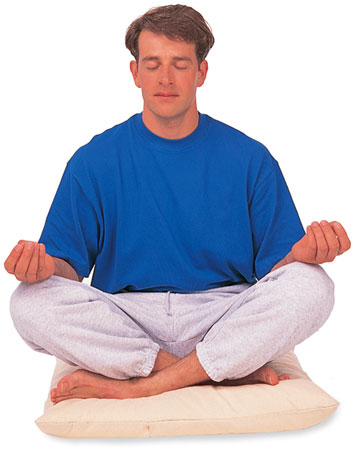Relaxing completely is not simply doing nothing: it is a technique
that can soon be learned. Take some time out for a few lessons, and you will
then find it easy – and pleasurable – to enjoy a regular period
of relaxation in your busy daily routine.
Beginning to relax
It is not always easy
to relax at home, since there are so many
demands on our time – telephones ringing, meals to be cooked,
clothes to
be ironed, and so on. Find a tranquil place in the house, and
set aside a
period of uninterrupted time to do the simple relaxation
exercise illustrated here. You may choose to try it out first thing in
the morning, perhaps,
before breakfast, or last thing at night, just before you go
to bed. Wear some
loose, baggy clothes that do not restrict your movement. Place
a rug or mat on
the floor, along with a cushion, then lie down and begin the
exercise.
Tensing your back muscles
Lying flat on the floor, stretch your arms out by either side. Use
the muscles in your shoulders, back, and buttocks to raise your torso slowly
off the ground. Feel the tension in your body, and hold the position for the
count of five.

2. relaxing your body
Slowly lower your back to the floor, and relax, breathing slowly
and deeply. Repeat as required.

Learning to meditate
Meditation has been used for centuries to counteract the effects of
stress. Sit on the floor in an upright position with your legs crossed, arms
resting on your thighs, and palms facing upwards. Close your eyes and breathe
through your nostrils, focusing on the air coming in and out of your body. Sit
for a few minutes, quietly aware of your body. After a while, you will feel the
tension start to ease away.
Calming down
The goal of meditation is the attainment of a state of calm
awareness. If you find it difficult to concentrate at first, persevere, and
slowly your mind will clear.

Sleeping better
Everybody needs a different amount of sleep. For adults, the average
is seven to eight hours a night, but many high-achieving people claim to
survive on four or five. Stress can cause us to sleep less than we need over a
prolonged period, and to sleep poorly. To improve the quality of your sleep,
make sure you relax before you go to bed. Switch off from all stimulating
activities – especially work – at least two hours beforehand. Try
meditating. Read some light fiction. Listen to some music, or watch television.
Have a warm, milky drink last thing at night, or try an infusion of one of the
many herbal plants that are thought to help sleep, such as camomile, valerian,
or passiflora.
Seeking help
People who have trouble in relaxing may find relaxation therapies
helpful. The many systems available include: Alexander Technique: learning how
to use the body in everyday tasks to minimize pain, stress, and injury:
Alexander technique:
learning how to use the body in everyday tasks to minimize pain,
stress, and injury.
Aromatherapy:
massaging the body with essential oils.

Flotation:
floating in a water tank filled with a solution of mineral
salts.
Shiatsu:
using finger pressure on certain areas of the body to relieve
stress and tension.
TIP
Listen to your favourite comedian. Laughter will help you to
relax.
TIP
Avoid eating or drinking heavily just before you go to bed.
TIP
When lying down to relax your body, start by relaxing your toes,
and work your way upwards.